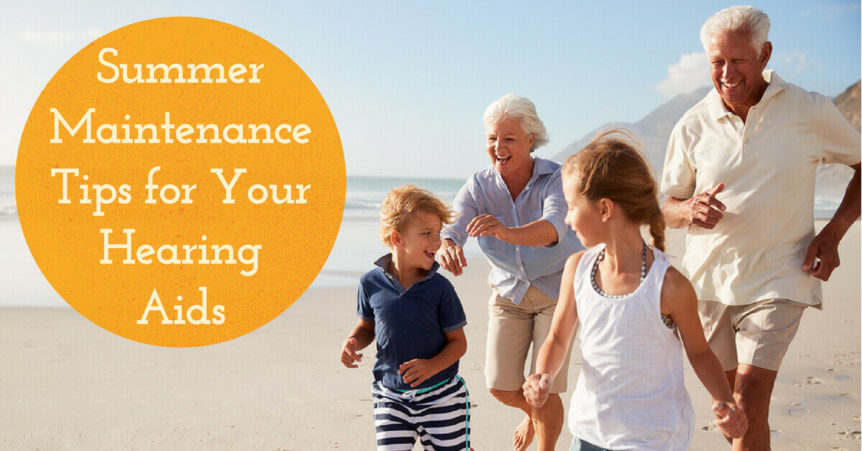Summer is here, along with all the outdoor activities we love. Maybe you are one of the very active types who loves swimming, hiking, or extreme sports in the summer. Or maybe you would prefer to take it easy with picnics or relaxing on the beach. Whichever summer style suits you best, if you having a hearing loss, the addition of hearing aids to your activities will be a crucial improvement.
Not only will you be able to safely take part in activities, but also you will be able to communicate with your family and friends in the process. Although incorporating hearing aids into your active lifestyle can be a great improvement in the summer, it is also essential to up your maintenance plan with exposure to the elements. The three riskiest elements to consider for summertime maintenance of your hearing aids are moisture, debris, and heat. With proper care, none of these should be a barrier to living an active lifestyle in the summer and continuing to hear with ease.
Moisture
Along with the summer heat comes our inclination to cool down with moisture. Of course, our bodies automatically use this cooling mechanism through perspiration. When moisture evaporates off of our skin, it takes with it some of the heat that has been building on the surface. Our ears are no exception to perspiration, either. Particularly with the added heat of a hearing aid, our ears may perspire to cool down. In addition to the natural perspiration process of our bodies, we also may get wet to cool down. Swimming pools are a relaxing way to cool down, and fresh and salt water in nature can do the same.
Although all of these sources of moisture can be a source of fun or relief in the summer, they can be a risk to hearing aids. Perspiration can accumulate inside the units gradually. Many people invest in a dehumidifying unit, which removes moisture from your hearing aids overnight. Beyond these simple solutions, it is essential not to submerge most hearing aids in water. Swimming, even in clean pool water, is likely to damage hearing aids. Furthermore, salt water can leave a residue on the hearing aids that might make them inoperable. Remember to remove your hearing aids before diving in the pool! And, if you’re storing your hearing aids, make sure they are in a cool dry place (the glove compartment of your car gets hot!).
Debris
Along with summer activities comes a whirlwind of debris that might collect on the surface. It is important to keep you hands clean before touching hearing aids all year long, but the summer brings a whole host of debris into the world of your aids. Sand can be particularly damaging to hearing aids, so try to keep sand out of your ears at the beach, as much as possible. Sunscreen lotion can also form a film on your hands that may get on hearing aids and clog the microphone or speaker. Of course, that saltwater buildup can accumulate in your ears, transferring to the aids even if they are inserted after swimming.
One of the simplest solutions is to bring hand wipes along to the beach. If you would like to remove or insert your hearing aids before or after swimming, simply wipe down your hands with a clean cloth or disposable wet wipe. This will make sure that the sand, sunscreen, and salt residue is removed from your hands before handling the aids.
Heat
The final risk to your hearing aids that is particular to summer is extreme heat. We may not even notice how quickly heat can build up in places like cars or sunrooms. If you leave your hearing aids in the window of a car, for example, they can be damaged quicker than you might think. Heat can also damage battery life, so be sure to keep your aids out of a hot car or other location to ensure maximum capability.
If you follow these basic maintenance tips in the summer, you will be able to enjoy the benefits of hearing aids alongside the fun of summer activities with your family and loved ones. Simple maintenance is all it takes to keep your aids in top working order all year long.
For a tune-up or maintenance on your devices, contact us at Neighborhood Hearing Aid Center. We are here to ensure your hearing aids perform their best this summer!

